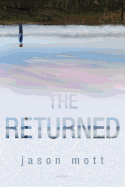
Between the premise--the dead walking the earth--and the fact that it's already been adapted as an ABC television series by Plan B (the production company behind the upcoming film version of World War Z), the casual observer might assume that Jason Mott's debut is yet another addition to the glut of zombie stories currently lurching around the entertainment market. However, nothing could be farther from the truth. Mott has created a much subtler, more thought-provoking experience, without a single lumbering corpse in sight.
Harold and Lucille Hargraves have had decades to learn how to live with the loss of their only son, Jacob, who drowned in a river on his eighth birthday in 1966. At least they have each other, even if they never got to see their beloved son grow up--until he shows up on their doorstep, very much alive and no older than the day they found his waterlogged body. "It's happening like this all over," agent Martin Bellamy tells them as he asks if they would like to claim their no-longer-deceased son. "It's a unique time for everyone."
Bellamy is from the Bureau, an organization formed to study the astounding phenomenon of the Returned. All over the world, the dead are coming to life, not as reanimated corpses crawling from the grave, but just as they were right before they died, and generally turning up quite far from home. No one knows how or why the Returned appear and, more to the point, no one knows how to react. Are these beings who look, speak and act like long-lost loved ones really who they appear to be? Are they a blessing from God, a sign of the end times, or something else altogether?
Harold cannot bring himself to believe, as Lucille does, that the little boy Bellamy places in their custody is really Jacob come back to them, but he reenters parenthood with as much enthusiasm he can muster for his wife's sake. However, their personal struggles soon seem small in the face of a global crisis. The Returned continue appearing at alarming rates, raising the question of how to sustain the earth if everyone who has ever lived returns to life. Not every country has treated the Returned as actual human beings, but the Hargraves are shocked when the United States takes action against the Returned under the guise of protecting them. Their newly remade family now divided, the Hargraves, their small-town neighbors, and even Agent Bellamy must decide which way their loyalties pull them, and at what cost.
Rather than attempt to force a pseudo-scientific explanation of the resurrections on readers, Mott takes the route of greater impact, and perhaps greater credibility, by focusing on the lives and emotions of the everyday characters struggling with the new turmoil in their lives. Mott's simple "what if" philosophy raises far larger issues than the question of "how" could. The story's underlying ethical questions occasionally dovetail with arguments about human cloning, such as whether a copy of a human being is a fully fledged person or only an echo with no rights of its own. Human fear of the unexplained largely drives the plot and throws small acts of compassion into sharp relief, making heroes of characters brave enough to offer the Returned the simple kindness and hospitality anyone might normally offer a neighbor. Lucille and Harold in particular, that elderly "pair of thin, wiry birds," follow their consciences rather than turn a blind eye, forcing confrontations that lead them to become the story's unlikely action heroes.
Perhaps the greatest power of this story is its ability to raise a bit of discomfort in its readers. Imagine for a moment that every dead person on Earth is coming back to life, and that they will need all of the food, shelter, and resources any other living person needs. The human race simply could not survive in such numbers. With no time to formulate a way out of the situation, what course of action seems best? Morally, one might say that the Returned have the same rights as anyone who has not yet died. On the other hand, in the face of dwindling resources and starvation, perhaps each of us would find ourselves asking, at some point, why the dead should have another chance at life if it means taking away from the still-living.
Thought-provoking, occasionally dreamlike, and centered around the most charmingly irascible couple in recent memory, Mott's story of literal life after death will catch readers by their hearts and capture their imaginations. We recommend not waiting around for the TV series. Grab this book as soon as you possibly can. --Jaclyn Fulwood

